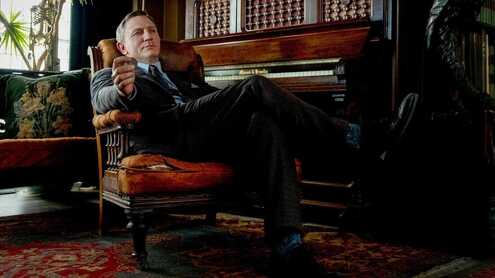B+ | A private detective is hired to investigate the suicide of a wealthy writer of mystery novels. Directed by Rian Johnson Starring Ana de Armas, Daniel Craig, and Chris Evans Review by Jon Kissel |

Knives Out doesn’t leave the big reveals for the big drawing room accusation scene, though it does contain one of those. Johnson wisely parcels out smaller reveals and twists throughout, keeping the viewer in a constant state of discovery and suspense. Every fifteen or twenty minutes provides another big aha moment or a recalibration of previously accepted information. A will reading midway through provides a wholesale raising of the stakes and endless possibilities as the film races to its climax, which rests on perceptions and interpretations of events as much as it does on the events themselves. As the reveals pile up, the film flashes back to hints and clues that were easily overlooked, a trope usually deadening but that manages to work here. Cumulatively, it adds up to one of the most entertaining filmgoing experiences of 2019 and has a wide appeal that will likely make Knives Out a future hit with repertory showings.
Unraveling whatever happened on the night in question is Craig, who continues to demonstrate how gifted he is with a Southern accent after this and Logan Lucky. Accuracy might be lacking, but it brings out a playful side of him far away from his taciturn interpretation of James Bond. The character of Benoit Blanc doesn’t come off as some unknowable genius with a supernatural gift of observation. He’s smarter than the average bear, sure, but not so smart that he can’t be fooled in a story that places him as the one who will sniff out the truth. He’s a little eccentric and a little weird, indulging in both theatrical flourishes that don’t impress other characters and disarming private moments, both of which demonstrate an internal life beyond deduction and turning wheels.
Within all that writerly panache and creative character creation rests delicious, even-keeled social satire. The first, lazy pass on a film about the wealthy is to make them all into mouth-breathing large adult sons, but Johnson’s aiming higher than low-hanging fruit. Knives Out is a film about class and the way that class transcends political affiliations. Undoubtedly, Richard and Walt stand in for the conservative rich, as does Walt’s shit-posting son Jacob (Jaedan Martell), but the limousine left, represented by Joni and her college age daughter Meg (Katherine Langford), are shown to have wafer-thin convictions when their bank accounts are in danger. Harlan was the only creator amongst the group, and his progeny either turned his money into more money or managed his talent to their own ends. None of that stops them from pretending that their status confers goodness or entitlement, instead of being born to or married to the right person. For those on the right, self-delusion is the order of the day, and for those on the left, spouting liberal bromides is a form of self-flagellation. They’d gladly march in a gay pride parade but would secretly pull the lever for any politician who wanted to lower the estate tax.
The family’s interactions with Marta, who slowly becomes the main character, most reveal the hollowness of their facades. No matter where the family stands on the political spectrum, there is a barely concealed, self-congratulatory condescension towards her. They keep calling her part of the family, but no one can remember where she’s originally from and Marta, who sees all this but recognizes that feeding into this fiction helps her keep her job, never corrects them. There’s an elemental indication of this when Richard proclaims Marta’s inclusion and then wordlessly hands her his dirty cake plate. She’s a nurse. Even on her official duties with Harlan, there’s something close to an equal relationship, but a key discrepancy between warmth and trust proves key to the whole story, another subtle inference to a larger political theme about the perceptions of immigrants. Johnson leans a bit too much into a saintly narrative around Marta, giving her a tic that forces her to vomit when she tells a lie, but outside of that tic, she’s believable as a full and decent person on whose competence rests the entire case.
As much fun as Knives Out is for the audience, it appears to be a lot of fun for the cast as well. The aforementioned Craig and de Armas form a great team once he asks her to join him as a walking lie detector. Collette is very much enjoying her Gwyneth Paltrow impression. I imagine Shannon giggling whenever he reads a script so obviously written with him in mind, as Walt is the embodiment of a short-tempered Shannon character. Curtis is terrifically imperious, in synch with her sharp outfit and hairstyle. Johnson is great as a man who everyone understands is stupid, except for the man himself. Evans is arguably having the most fun as a callow golden boy in a fluffy sweater, far away from the upright perseverance of Captain America. The way he slouches in a chair is Joffrey-esque.
Despite the overblown pushback against The Last Jedi, Johnson is firmly ensconced in a can’t-miss phase of his career. With Knives Out, he lays claim to his greatest, non-franchise success yet, making him one of the few Marvel/Star Wars hired-hand directors to break away from their corporate mega-projects with their own idea. Johnson joins thoughtfulness with comedy and invention for an excellent demonstration of his cinematic powers. So much of Knives Out is simply about the value of hard work and good humor, and Johnson is the Hollywood embodiment of exactly that. B+
 RSS Feed
RSS Feed